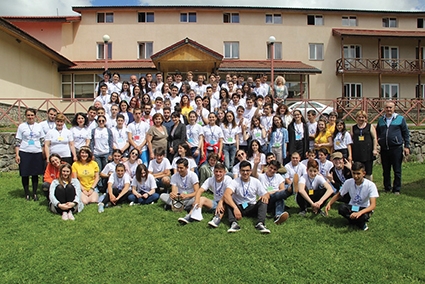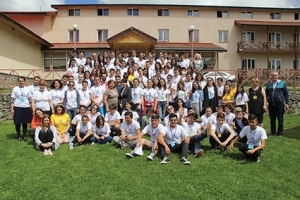Young Georgian Students Participate in Active Citizenship Summer Camp
From June 19 to 22, 80 young Georgians and 11 teachers participated in a summer camp organized by PH International. The meeting took place in the resort of Bakuriani and gathered kids from the eleven regions of Georgia in order to share their projects and the experiences they had regarding civic education.
The children had been selected for their motivation in the projects they carried out in their schools as part of the civic courses they attend. These projects deal for the most part directly with the problems Georgia faces nowadays, at a national level as well as specific local problems. It implied in particular community improvement such as internet and software education for older people, cleaning and the arrangement of public spaces, or sensitization activities to other children on a wide range of subjects. They were often accompanied by local authorities but managed the projects by their own means.
The summer camp organized by PH International is a further step for the children to exchange with like-minded students from throughout Georgia about their successes and the challenges they faced. The youth also participated in different workshops and activities such as sketches, again with sensitization purposes.
The main goal of the camp was to encourage their initiatives and help them become active citizens, even if they seemed already very engaged in this sense, training them in communication and leadership. Several exterior speakers also came to the camp and raised the curiosity of the students, including a Georgian activist who raised the issue of early marriage, a businessman who taught them how to build a career, and three journalists who talked about their jobs.
Civic Education is relatively new in Georgia, and has been strongly supported by PH International in the context of the Momavlis Taoba Program, funded by USAID, the United States Agency for International Development. The association has over the years trained more than 500 teachers in this new subject and accompanies nowadays 480 schools across Georgia, particularly by furnishing them with textbooks free of charge, including Armenian and Azerbaijani language schools. It also grants small-amount funding to selected projects for community development and works with the Ministry of Education and Science to raise awareness on this issue.
David Mongazon












